Explore the Flickering, Forgotten Past of African-Americans in Silent Film
An estimated 80 percent of silent movies with all-black casts are thought to be lost, but a new project is making sure the people who made them aren’t
(From Smithsonianmag.com) Silent films flickered across the screen in black and white, but popular memory of the silent era is more white than black. But just how involved were African-Americans in the early film industry, anyway? It’s a question that is only just starting to be answered—and thanks to a new digital resource, the untold story of African-Americans and silent film is finally beginning to be told.
Early African-American Film: Reconstructing the History of Silent Race Films, 1909-1930 is a website and database devoted to tracking the black filmmakers, actors and artists who contributed to the early film industry. So far, the site tracks 759 African-American people who participated in the silent film industry and documents 303 silent films, 175 film companies and dozens of resources on African-American participation in silent films. And like many good things, it was born of frustration on the part of researchers. (read more)
A Single Migration From Africa Populated the World, Studies Find

The KhoiSan, hunter-gatherers living today in southern Africa, above, are among hundreds of indigenous people whose genetic makeup has provided new clues to human prehistory. Credit Eric Laforgue/Gamma-Rapho, via Getty Images
(From NY Times) Modern humans evolved in Africa roughly 200,000 years ago. But how did our species go on to populate the rest of the globe?
The question, one of the biggest in studies of human evolution, has intrigued scientists for decades. In a series of extraordinary genetic analyses published on Wednesday, researchers believe they have found an answer.
In the journal Nature, three separate teams of geneticists survey DNA collected from cultures around the globe, many for the first time, and conclude that all non-Africans today trace their ancestry to a single population emerging from Africa between 50,000 and 80,000 years ago.
“I think all three studies are basically saying the same thing,” said Joshua M. Akey of the University of Washington, who wrote a commentary accompanying the new work. “We know there were multiple dispersals out of Africa, but we can trace our ancestry back to a single one.” (read more)
New Film To Highlight The Impact HBCUs Had On American History
Stanley Nelson’s forthcoming documentary reminds us that the existence of black colleges is crucial
 (From HuffingtonPost.com) In the nearly 180 years that historically black colleges and universities have been around, these schools have been a pillar in the black community and have made major contributions. However, the impact these schools had on its students over the years, often goes untold and has been overlooked while the relevancy of HBCUs has constantly been questioned by outsiders.
(From HuffingtonPost.com) In the nearly 180 years that historically black colleges and universities have been around, these schools have been a pillar in the black community and have made major contributions. However, the impact these schools had on its students over the years, often goes untold and has been overlooked while the relevancy of HBCUs has constantly been questioned by outsiders.
Yet, these educational institutions remain a crucial fixture in American history.
Acclaimed documentarian Stanley Nelson wanted to emphasize that in his forthcoming film “Tell Them We Are Rising: The Story of Historically Black Colleges and Universities.” Nelson, who is the product of two HBCU graduates, told The Huffington Post that a film focusing on HBCUs has been long overdue. Nelson’s work is set to premiere on PBS in fall 2017.
HBCUs have been instrumental in this country. Our parents and grandparents and great-grandparents, there was no other place they could go to school,” he said. “This is the cornerstone of the African-American community. And I think that most people don’t know anything about it.” (read more)
TIPHC Bookshelf
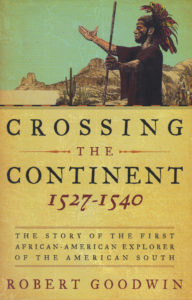 Published scholarship on black history in Texas is growing and we’d like to share with you some suggested readings, both current and past, from some of the preeminent history scholars in Texas and beyond. We invite you to take a look at our bookshelf page — including a featured selection — and check back as the list grows. A different selection will be featured each week. We welcome suggestions and reviews. This week, we offer, “Crossing the Continent, 1527-1540, The Story of the First African-American Explorer of the American South,” by Robert Goodwin.
Published scholarship on black history in Texas is growing and we’d like to share with you some suggested readings, both current and past, from some of the preeminent history scholars in Texas and beyond. We invite you to take a look at our bookshelf page — including a featured selection — and check back as the list grows. A different selection will be featured each week. We welcome suggestions and reviews. This week, we offer, “Crossing the Continent, 1527-1540, The Story of the First African-American Explorer of the American South,” by Robert Goodwin.
Nearly two centuries before Meriwether Lewis and William Clark began their epic trek to the Pacific coast, a group of three Spanish noblemen and an African survived shipwreck, famine, Indian attack, and disease to make the first crossing of North America in recorded history. Drawing on contemporary accounts and long-lost records, Robert Goodwin tells the amazing story of their odyssey through the American South. Goodwin’s groundbreaking research in original Spanish archives has led him to a radical new interpretation of American history-one in which an African slave named Esteban emerges as the nation’s first great explorer and adventurer. Esteban (1500–1539) is the first man born in Africa to die in North America about whom anything is known — and is acknowledged as the first black Texan. The first African American with a name, he was also the first great pioneer from the Old World to explore the entirety of the American South with his three companions. In a feat of historical research, Goodwin takes us on an incredible adventure from Africa to Europe to America, filled with physical endurance, natural calamities, cannibalism, witchcraft, miraculous shamanism, and divine intervention-challenging the traditional history of the nation’s discovery and placing Esteban at the heart of our historical record.
This Week In Texas Black History, Nov. 6-12
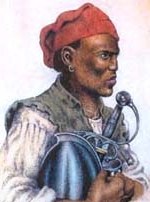 6 – On this cold, post-storm morning in 1528, Moroccan Moor servant Esteban (Estevanico) waded ashore near Galveston with a group of shipwrecked Spanish conquistadors and became the first African to set foot in what would become Texas. He and the other survivors would wander for eight years, at times as hostages of Native American tribes, through Texas and along the Rio Grande and into Mexico. Esteban is also considered the first black person to explore Arizona and New Mexico.
6 – On this cold, post-storm morning in 1528, Moroccan Moor servant Esteban (Estevanico) waded ashore near Galveston with a group of shipwrecked Spanish conquistadors and became the first African to set foot in what would become Texas. He and the other survivors would wander for eight years, at times as hostages of Native American tribes, through Texas and along the Rio Grande and into Mexico. Esteban is also considered the first black person to explore Arizona and New Mexico.
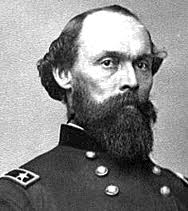 6 – Maj. Gen. Gordon Granger was born on this day in 1822 in Joy, Wayne County, New York. As Union commander of the Department of Texas, Granger would arrive at Galveston on June 19, 1865 and deliver General Order No. 3, announcing that slaves were free, as a result of the Emancipation Proclamation, issued two years earlier. The announcement is the basis for Juneteenth celebrations.
6 – Maj. Gen. Gordon Granger was born on this day in 1822 in Joy, Wayne County, New York. As Union commander of the Department of Texas, Granger would arrive at Galveston on June 19, 1865 and deliver General Order No. 3, announcing that slaves were free, as a result of the Emancipation Proclamation, issued two years earlier. The announcement is the basis for Juneteenth celebrations.
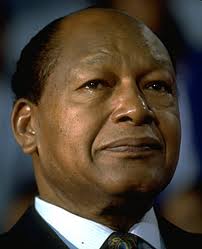 6 – In 1973, on this day, Los Angeles elected its first black mayor, Tom Bradley, a native of Calvert, Texas. The son of sharecroppers and the grandson of slaves, Bradley moved with his family to Los Angeles at age seven. In 1963, after an outstanding career with the Los Angeles Police Department, Bradley became the first African-American elected to the Los Angeles city council. Ten years later, he became the first African-American mayor of a predominantly white city and served an unprecedented five terms. His achievements included securing the 1984 Summer Olympic Games for Los Angeles.
6 – In 1973, on this day, Los Angeles elected its first black mayor, Tom Bradley, a native of Calvert, Texas. The son of sharecroppers and the grandson of slaves, Bradley moved with his family to Los Angeles at age seven. In 1963, after an outstanding career with the Los Angeles Police Department, Bradley became the first African-American elected to the Los Angeles city council. Ten years later, he became the first African-American mayor of a predominantly white city and served an unprecedented five terms. His achievements included securing the 1984 Summer Olympic Games for Los Angeles.
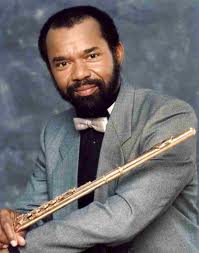 10 – Renowned jazz flutist Hubert Laws was born on this day in 1939 in Houston. Laws played in the marching band at Phillis Wheatley High School in Houston then studied music at Texas Southern University before beginning his professional career playing in Houston jazz groups such as the Crusaders. Has played an recorded with numerous artists including Quincy Jones, Herbie Hancock, Aretha Franklin, Ella Fitzgerald, and Leonard Bernstein and was recipient of the 2011 National Endowment for the Arts Jazz Masters Award and lifetime achievement award from the NEA in the field of jazz.
10 – Renowned jazz flutist Hubert Laws was born on this day in 1939 in Houston. Laws played in the marching band at Phillis Wheatley High School in Houston then studied music at Texas Southern University before beginning his professional career playing in Houston jazz groups such as the Crusaders. Has played an recorded with numerous artists including Quincy Jones, Herbie Hancock, Aretha Franklin, Ella Fitzgerald, and Leonard Bernstein and was recipient of the 2011 National Endowment for the Arts Jazz Masters Award and lifetime achievement award from the NEA in the field of jazz.
 10 — Wiley College was founded on this day in 1873 and was the first black college west of the Mississippi River. Named in honor of Bishop Isaac T. Wiley, an outstanding minister, medical missionary and educator, the school opened its doors just south of Marshall, Texas with two frame buildings.
10 — Wiley College was founded on this day in 1873 and was the first black college west of the Mississippi River. Named in honor of Bishop Isaac T. Wiley, an outstanding minister, medical missionary and educator, the school opened its doors just south of Marshall, Texas with two frame buildings.
11 — Captain Norman W. Scales, a Tuskegee Airman and the first licensed black pilot in Austin, was born on this day in 1918. Scales flew 70 missions over enemy territories and earned the Distinguished Flying Cross and certificate of valor.
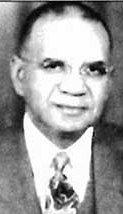 12 — On this date in 1893, physician James Lee Dickey was born near Waco. A graduate of Tillotson College (now Huston-Tillotson University) in 1916, he entered Meharry Medical College in Nashville and graduated in 1921. Dickey returned to Texas to help is widowed mother raise his eight siblings and settled in Taylor, northeast of Austin. Dickey was the only black doctor in Williamson County and one of only 130 black doctors in Texas. He established a medical facility that began with a three-bedroom clinic and expanded to a fifteen-bed hospital with modern surgical and obstetrical facilities. The clinic was open to all needy patients — regardless of race — from Williamson, Lee, Travis, Milam, Bell and Bastrop counties. Early in his career he also curbed a typhoid fever epidemic in 1932 through a vigorous vaccination program. He became a trustee of Tillotson college and in 1953 was named Taylor’s most outstanding citizen by the chamber of commerce, the first time a black man had been so honored in the community.
12 — On this date in 1893, physician James Lee Dickey was born near Waco. A graduate of Tillotson College (now Huston-Tillotson University) in 1916, he entered Meharry Medical College in Nashville and graduated in 1921. Dickey returned to Texas to help is widowed mother raise his eight siblings and settled in Taylor, northeast of Austin. Dickey was the only black doctor in Williamson County and one of only 130 black doctors in Texas. He established a medical facility that began with a three-bedroom clinic and expanded to a fifteen-bed hospital with modern surgical and obstetrical facilities. The clinic was open to all needy patients — regardless of race — from Williamson, Lee, Travis, Milam, Bell and Bastrop counties. Early in his career he also curbed a typhoid fever epidemic in 1932 through a vigorous vaccination program. He became a trustee of Tillotson college and in 1953 was named Taylor’s most outstanding citizen by the chamber of commerce, the first time a black man had been so honored in the community.
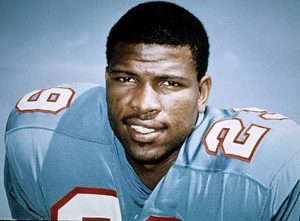 12 — Ken Houston, Pro Football Hall of Fame safety, was born on this day in 1944 in Lufkin, Texas. Houston played collegiately at Prairie View A&M, then starred with the Houston Oilers and Washington Redskins. Houston became the National Football League’s premier strong safety of 1970s and was All-Pro or All-AFC/NFC eight of nine years, 1971-1979.
12 — Ken Houston, Pro Football Hall of Fame safety, was born on this day in 1944 in Lufkin, Texas. Houston played collegiately at Prairie View A&M, then starred with the Houston Oilers and Washington Redskins. Houston became the National Football League’s premier strong safety of 1970s and was All-Pro or All-AFC/NFC eight of nine years, 1971-1979.
Blog: Ron Goodwin, author, PVAMU history professor
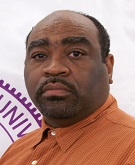 Ron Goodwin’s bi-weekly blog appears exclusively for TIPHC/TBHPP. Goodwin is a San Antonio native and Air Force veteran. Generally, his column will address contemporary issues in the black community and how they relate to black history. He and the TIPHC/TBHPP staff welcome your comments. His latest blog is, “Post Obama = Neo Hate” Read it
Ron Goodwin’s bi-weekly blog appears exclusively for TIPHC/TBHPP. Goodwin is a San Antonio native and Air Force veteran. Generally, his column will address contemporary issues in the black community and how they relate to black history. He and the TIPHC/TBHPP staff welcome your comments. His latest blog is, “Post Obama = Neo Hate” Read it
Submissions Wanted
Historians, scholars, students, lend us your…writings. Help us produce the most comprehensive documentation ever undertaken for the African American experience in Texas. We encourage you to contribute items about people, places, events, issues, politics/legislation, sports, entertainment, religion, etc., as general entries or essays. Our documentation is wide-ranging and diverse, and you may research and write about the subject of your interest or, to start, please consult our list of suggested biographical entries and see submission guidelines. However, all topics must be approved by TIPHC/TBHPP editors before beginning your research/writing.
We welcome your questions or comments via email or telephone – mdhurd@pvamu.edu.
